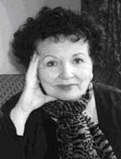Poetry Month is officially over, but that’s no reason to abandon our arbitrary and occasional Poetry A-Z series…
I is for Inez, Colette
 I couldn’t think of a poet whose last name started with the letter I, so I asked google to help me out, and google said, hey, you silly sausage, how about Colette Inez? Nice job, google! (And if you’re reading this today, June 26th, please google the word gay and enjoy the celebratory rainbow doodle.)
I couldn’t think of a poet whose last name started with the letter I, so I asked google to help me out, and google said, hey, you silly sausage, how about Colette Inez? Nice job, google! (And if you’re reading this today, June 26th, please google the word gay and enjoy the celebratory rainbow doodle.)
Colette Inez was born in Europe in 1931 under grimly romantic circumstances:
I was conceived in Paris, the unexpected outcome of a love affair between a French archivist and a French-American priest whose mother claimed Irish descent. In her ninth month, my mother crossed the border into Belgium where I was born and soon after packed off to the Catholic sisters, my stern caretakers for the next eight years.
At the age of eight, with Europe on the brink of war, Inez was sent to America, where she spent her adolescence in a fairly menacing Long Island foster home. She found solace in literature, turning to the works of Emily Dickinson, Robert Frost, and Robinson Jeffers, who moved her with his “disdain for mankind and love of hawks, horses, and cliffs.” She won her first poetry competition while she was an undergraduate at Hunter College, and this gave her the necessary confidence to immerse herself in the New York poetry scene. She began attending readings at the 92nd Street Y and hanging out at poetry cafés in the Village. After graduating in 1961, she initially found work “in the blur of big corporate offices” as a switchboard operator and secretary, before beginning her teaching career. Over the years she lectured at a number of universities, including Bucknell, Cornell, the New School, and Columbia, where she was a long-time faculty member of the undergraduate writing program.
Inez has published ten poetry collections and a memoir, The Secret of M. Dulong. Her first collection, The Woman Who Loved Worms (Doubleday, 1972), won the Great Lakes Colleges Association National First Book Award and was reissued by Carnegie Mellon University Press in 1991. More recent volumes include the excellently titled Spinoza Doesn’t Come Here Anymore (Melville House, 2004), and Horseplay (WordTech, 2011). She has won numerous awards, including two Pushcart Prizes, and has received fellowships from the Rockefeller and Guggenheim Foundations and from the National Endowment for the Arts.
Her poetry is direct, fiery, and ebullient, full of sentiment but seldom sentimental. She’s also a courageous and deeply personal writer, unafraid to examine the legacy of her peripatetic and troubled childhood. In an essay for the Poetry Society, Inez had this to say concerning the issue of identity:
I’d have to describe myself as a narrative, lyric poet who writes in American English. I am an American citizen, long and well-married to a Brooklyn-born freelance writer whose parents were immigrants from the Polish Pale. I am an American whose roots are European although I certainly keep in mind that my true ancestors were also one-celled plants floating in water. My interests are varied, yet the mysteries of my French family and their history continue to inform and . . . haunt my work.
Here are a couple of my favorite Inez poems:
The Tuner
Choose how the forest
was deprived of a tree.
Blight, wind, fire?
I once lost a cantankerous man,
who tuned pianos.
Tall, an oak to me,
he goaded music from the keys.
I almost see him biting on his pipe,
tamping down the London Dock.
Blown back leaves, birds, moths,
the gestures here.
Pendulum, tool box auctioned off.
Summer roars another blast of green.
“I like to see a piano perspire,”
he’d say to me, slamming the lid
of the Baldwin.
* * *
Blind Mouths
He looks at a circle
of mouths.
Nothing to say.His grandparents sit
in another blind time,
each in a circle
of worrying eyes.The children, away,
rolling like hoops,
a distant park
eating their screams.In the speed of hunger
his parents meet,
two round mouths
to devour their child.Round as moons
the mirrored plates
reflecting the rooms
in a widening haze
of losses and blame.The bicycle locked
in the fog of old toys,
wheels, two mouths
of spokes and dust.Nobody speaks.
The table is cleared.
He looks at a field of snow,
the whiteness longer
than he dreams,
a blizzard of scraps
confusing the houselarge as a van
devouring roads
as it moves through the years
pregnant with his furniture.
